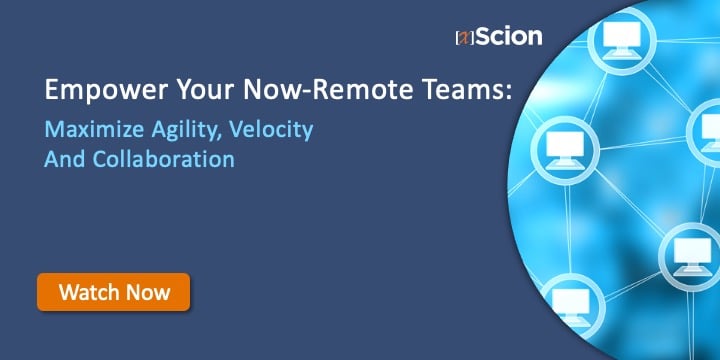Over the last few weeks and days, the world and how we go about life, has changed dramatically in response to the COVID-19 pandemic. If your business is able to remain operating during this time, it’s almost guaranteed that your business operations are fundamentally altered in every way. How do we, as businesses, adjust to this enormous and potentially deeply impactful change? Turning to Agile principles that are based on adoption of rapid change, which we lean on every day in our technology environment, is a great place to start.
Lessons from the Agile Manifesto and the Technology Industry
Operating in the tech world is about responding to rapidly changing requirements and capabilities, which is what we are facing with the COVID-19 virus. Principles and best practices in tech reduce the friction, cost and time spent in the change process. We can apply what we know to facing this pandemic in a collective act of solidarity as we adjust our individual professional and private lives and gear our organizations to reduce the time and cost of the disruption brought on by the COVID-19 pandemic. Doing so positions us all in a united effort to ultimately stop the spread and minimize the human cost of the COVID-19 virus.
A key mindset based in the Manifesto for Agile Software Development is to welcome changing requirements, even late in development. New requirements or problems can arise at any time and the choice is either to make changes or live with the consequences of not changing. In software development the consequences can be an ineffective product or the high cost of backtracking to where changes should have been implementing and re-starting from there. The consequences of not changing in the face of a viral epidemic are harsher. How does this mindset apply to all of us today?
Individual Actions
The COVID-19 pandemic and global containment and mitigation efforts have been an unwelcome change. How do we embrace it? By shifting focus from previous comforts and current inconveniences to the well-being of the community at large. World Health Organization Director-General Tedros Adhanom said recently:
“Washing your hands will help to reduce your risk of infection. But it’s also an act of solidarity because it reduces the risk you will infect others in your community and around the world. Do it for yourself, do it for others.”
In the Agile Manifesto, individuals and interactions are valued over processes and tools. This recognizes that any organizational effort on a project is built on the actions of individuals within it. If individuals don’t buy into the processes and tools the effort can be derailed. Similarly, the global response to the COVID-19 outbreak is built on individuals and their actions.
Individually and as organizations we can take simple actions that reduce the risk of spreading infection and save lives while pressing forward to achieve important organizational missions that can be even more crucial in times of crisis. Simple alterations of our day-to-day routines are worthy change we’ve collectively embraced as part of a global effort.
Corporate Actions – Adjust Your Processes to Support Your Team
As organizations, we can prioritize valuing individuals and interactions over processes and tools as we change how we work. Whatever collaboration tools you use to work as remote teams, there are tactics to keep everyone connected and supported.
- Brief daily group check-ins
- Create virtual hallways
- Hold virtual happy hours/themed events
- Have reminders to get up, step outside and take quick walks during the workday. Colleagues can walk “together” connected through their smart phones
- Use big screens to include families in virtual social events
- Recognize individuals face unique challenges with remote work
Corporate Actions – Collaborate with Your Customers
While many individuals have retreated to work from home, organizations have been called to lean in to combat the crisis. Healthcare, financial services, shipping and logistics, education, major retailers and even fast food giants are all adjusting with a focus to the challenges of stopping the spread of the virus. For most organizations business has been disrupted, in some cases dramatically, but their objectives remain and are even heightened in importance.
Reach out to clients to see how you can help them smooth the disruption, quickly change course where needed and continue to carry out their important missions.
- Be supportive. Regularly reach out by phone to clients to learn about their challenges and offer help.
- Be proactive. Implement communication strategies that include direct outreach and indirect check-ins with teams working with partners to understand client challenges.
- Communicate COVID-19 Policy. Assure clients of your actions taken to protect employees and report any heightened risk of COVID-19 contact.
While responding to the COVID-19 outbreak requires us to separate physically, it takes us coming together figuratively to successfully combat the virus. We all play key roles organizationally and individually. As we face change that is disrupting how we live, work and go about business, the Agile principles we rely on in the tech world provide guidelines for transforming how we operate and surviving the disruption of the COVID-19 pandemic.
For More Tips & Actionable Advice, watch our OnDemand webinar.
Empower Your Now-Remote Teams: Maximize Agility, Velocity & Collaboration
Our experts discuss how to ensure your teams are tactically set up for success, how to keep your corporate culture and even how to accelerate productivity. Watch Now.





